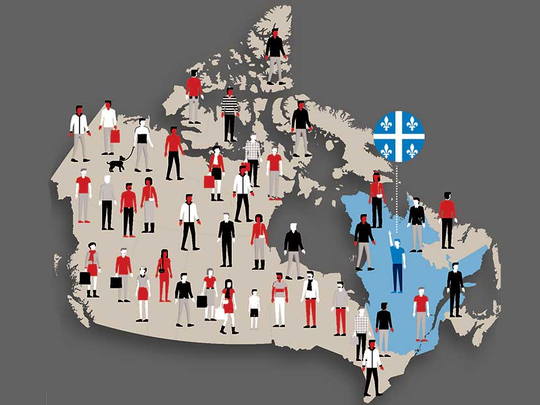
Like many diverse countries, Canada houses minority communities both old and new, and the ensuing tension provokes a familiar dilemma: Can a state treat all minorities with respect and fairness while offering above-and-beyond cultural and political protections to the groups it deems especially worth defending?
Much consternation was had in Quebec recently when figures from the 2016 Canadian census (since shown to be false) appeared to correlate rising levels of immigration with declining use of French in the French-speaking province. Some politicians found the timing disturbing — August marked the 40th anniversary of Quebec’s Charter of the French Language, a sweeping piece of legislation intended to entrench French in all corners of Quebec life — and began thundering about the need for even tougher laws.
In Canada’s English-speaking provinces, declining rates of English are generally characterised by Anglo politicians as inevitable — if not exciting (Toronto Mayor John Tory even proclaimed an official day to “promote linguistic and cultural diversity”). Yet, English Canada is not considered the protected reserve of a particular people, while Ottawa explicitly recognises Quebec as the home of the French Canadian “nation”.
Though unanimously endorsed by Canada’s political class, this notion that Quebec is — and should be — the country’s French-Canadian homeland grinds awkwardly against the egalitarian, “post-national” multiculturalism that has earned Canada so much international acclaim in the age of Trump and Brexit. Keeping Quebec French (however broadly one wants to define that adjective), after all, implies a certain level of judgement should await residents who are not.
For the past four years, successive Quebec administrations, representing two different political parties, have been trying to pass some manner of public-sector “headgear ban”, mostly to prevent Muslim women from wearing headscarves in government-controlled spaces. This dislike of “ostentatious displays” of religiosity from minorities — said to be rooted in the French tradition of aggressive secularism — has been similarly blamed for the low Quebec poll numbers of Jagmeet Singh, the popular turban-wearing Indo-Canadian front-runner to lead the New Democratic Party. Many will find such explanations overly-intellectualised excuses, of course. Earlier this month, the CBC aired a documentary about an aggressive Quebec anti-immigrant group called La Meute, which the CBC characterised as the largest far-right group in the province “and maybe even the country”.
The French Canadians consider themselves a persecuted minority and have fair historic justification. The French of North America are a conquered, colonised people who faced systemic discrimination under Canada’s long reign of Anglo-supremacy. Yet, there are many other minority groups in Canada who can plead a similar case, including the non-French minority within Quebec itself. Many of Quebec’s customs and laws are intended as French Canadian empowerment after years of marginalisation, though in practice this can often look like one minority demanding its cultural grievances supersede all others.
Problems, hypocrisies and paradoxes
Facing a vacancy on Canada’s Supreme Court, last October, Prime Minister Justin Trudeau skipped an opportunity to appoint a high court judge of colour (something Canada has never had) in favour of a white, French-speaking male because Trudeau had promised Quebec voters a Supreme Court in which every judge speaks fluent French.
The problems, hypocrisies and paradoxes surrounding les Qubcois may be a uniquely Canadian issue, but analogies can be found in most western democracies these days. Like Canada, many western nation-states were originally set up as limited arrangements of a few ethnic groups, only to see the drama between those groups appear increasingly dated or privileged as populations grow more diverse, inhabited by people from every corner of the globe.
From Catalonia to Corsica, virtually every European nation includes a historically aggrieved community whose dreams of autonomy threaten being overshadowed by their country’s more modern cultural cleavages.
Canada offers no useful lesson on how to resolve the tension between minorities old and new — except perhaps that double standards and blind spots are a more inescapable part of managing 21st-century multiculturalism than many may like to believe.
— Washington Post
J.J. McCullough, a political commentator and cartoonist from Vancouver, is a columnist at Loonie Politics.










